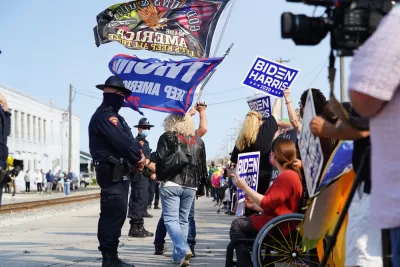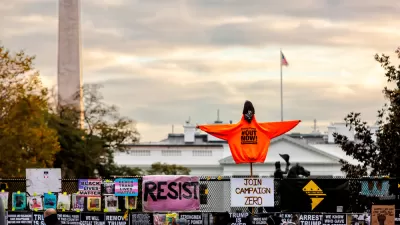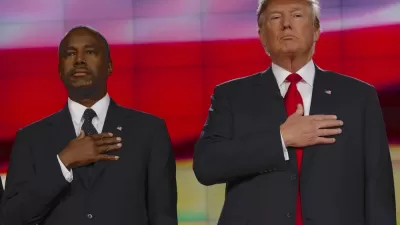Trump has been repeatedly criticized for misunderstanding the suburbs, but former Vice President Jose Biden's take on the subject during the debate also missed the mark.

Anyone who tuned into the presidential debate earlier this week in the hopes that a promised segment on race and violence in cities would reveal a substantive and revealing discussion was probably disappointed.
Kriston Capps and Laura Bliss provide commentary and analysis of one of the few coherent moments from the debates—when the conversation briefly turned to the subject of the suburbs.
Here's the debate exchange, as transcribed in the article:
“Our suburbs would be gone” under a Biden presidency, [Trump] said. “You would see problems like you’ve never seen before.”
Biden replied: “He wouldn’t know a suburb unless he took a wrong turn. I was raised in the suburbs. This is not 1950. All these dog whistles and racism don’t work anymore. Suburbs are by and large integrated.”
The point made by Trump is familiar, having been a key talking point for several months now, and Biden's response is probably an echo of the many criticisms of Trump's understanding of the suburbs. So, Bliss and Capps instead take issue with Biden's use of the word "integrated," which they characterize as "not quite right."
Here's how the writers summarize the criticism:
“The suburbs” is a sweeping American category that includes the the majority of the U.S. population. As of 2010, they also contain the majority of every demographic group. In that sense the suburbs are indeed diverse. But as Brookings Nonresident Senior Fellow Elizabeth Kneebone has written, “they don’t live in the same suburbs.” Within the vast swath of American land that is vaguely defined as the suburbs, racial and ethnic groups remain separated.
The problem is segregation, according to Capps and Bliss, which is why the federal Fair Housing Act is necessary, and why the Trump administration has worked throughout the last four years to weaken enforcement of fair housing rules.
"So are suburbs 'by and large integrated'?" ask Capps and Bliss to interrogate the statement by Biden during the debate.
Compared to cities, perhaps, where the concentration of poverty is severe and soaring housing prices have locked out the middle class. But even as the suburbs grow more diverse, they stand to grow more segregated. The Trump administration has done away with the federal government’s best tools for assessing and comparing segregation patterns, which means that growing suburbs may use federal dollars for housing, highways and education in a way that makes segregation worse.
FULL STORY: Diverse? Yes. But Are U.S. Suburbs Actually Integrated?

Planetizen Federal Action Tracker
A weekly monitor of how Trump’s orders and actions are impacting planners and planning in America.

Congressman Proposes Bill to Rename DC Metro “Trump Train”
The Make Autorail Great Again Act would withhold federal funding to the system until the Washington Metropolitan Area Transit Authority (WMATA), rebrands as the Washington Metropolitan Authority for Greater Access (WMAGA).

DARTSpace Platform Streamlines Dallas TOD Application Process
The Dallas transit agency hopes a shorter permitting timeline will boost transit-oriented development around rail stations.

Supreme Court Ruling in Pipeline Case Guts Federal Environmental Law
The decision limits the scope of a federal law that mandates extensive environmental impact reviews of energy, infrastructure, and transportation projects.

Texas State Bills to Defund Dallas Transit Die
DART would have seen a 30% service cut, $230M annual losses had the bills survived.

Bikeshare for the Win: Team Pedals to London Cricket Match, Beats Rivals Stuck in Traffic
While their opponents sat in gridlock, England's national cricket team hopped Lime bikes, riding to a 3-0 victory.
Urban Design for Planners 1: Software Tools
This six-course series explores essential urban design concepts using open source software and equips planners with the tools they need to participate fully in the urban design process.
Planning for Universal Design
Learn the tools for implementing Universal Design in planning regulations.
Roanoke Valley-Alleghany Regional Commission
City of Mt Shasta
City of Camden Redevelopment Agency
City of Astoria
Transportation Research & Education Center (TREC) at Portland State University
US High Speed Rail Association
City of Camden Redevelopment Agency
Municipality of Princeton (NJ)




























